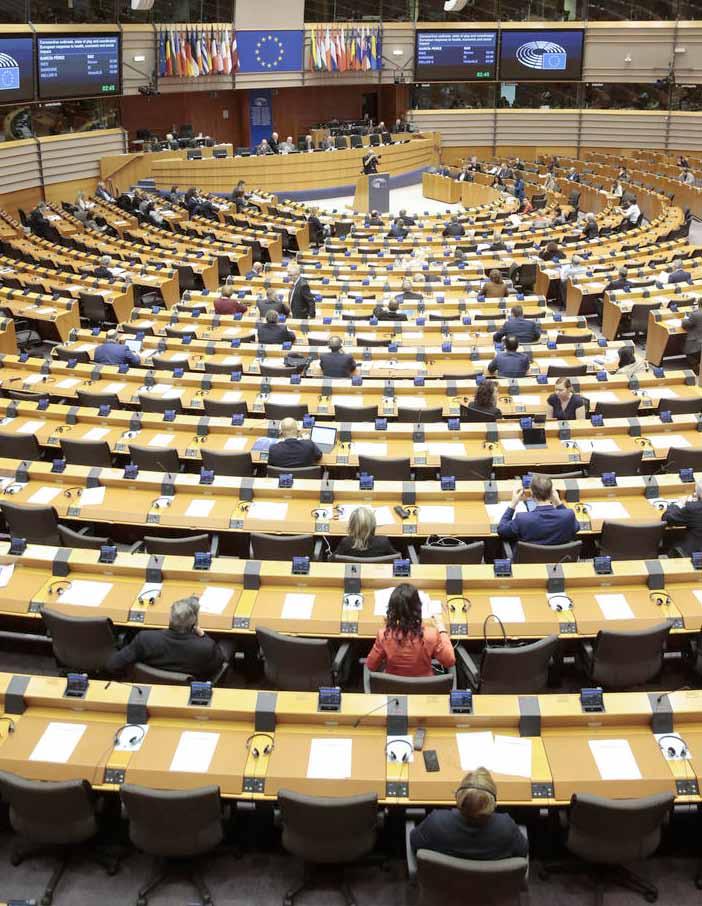
4 minute read
CommuniqEU
Corporate DispatchPro
zahra
CommuniqEU
Health
As part of the EU’s efforts to hasten the availability of a vaccine against the novel coronavirus, the European Parliament has adopted a regulation allowing such vaccines and treatments be developed more quickly.
Developing and deploying an effective and safe vaccine against the virus is the most likely permanent solution to stop the pandemic. To this end, the Commission has proposed an EU vaccines strategy for the pandemic including a temporary and strictly Covid-related derogation from certain rules for clinical trials.
Clinical trials for Covid-19 vaccines are a time-consuming step before authorisation, as they need to be carried out in several member states to ensure that the populations for which the vaccines are intended are represented and in order to generate robust and conclusive data.
The derogation will facilitate the development, authorisation and consequently availability of Covid-19 vaccines and treatments. In their debate last week, members of the Committee on the Environment, Public Health and Food Safety agreed to adapt the current rules but stressed that standards for vaccine quality, safety and efficacy must be maintained.


Corporate DispatchPro

zahra
CommuniqEU
Financial Services
The EU continued with its efforts to reform the Capital Markets Union with a new report presented by its Chair, Thomas Wieser. This report sets out 17 recommendations aimed at removing the biggest barriers in the EU’s capital markets and increase European capital markets’ competitiveness.
During the latest video conference of economics and finance ministers, EU Member States exchanged views on the priorities to bring the CMU forward, in particular with a view to overcoming the economic consequences of the Covid-19 crisis and to creating solid EU-based alternatives for capital markets after Brexit. This discussion will feed into the preparations of a new Commission CMU action plan, which is expected to be published by the end of the year.
Strengthening the Capital Markets Union will be among the top priorities of the German Presidency in the economic field. Wieser explained that capital markets have a crucial role to play in the post-Covid recovery, to provide additional funding sources for EU companies and to facilitate the green and digital transformations. The Commission set a goal to agree on a common approach to priorities for the EU Council, looking to further strengthen the initiative by the end of the year.


Corporate DispatchPro

zahra
CommuniqEU
Anti-Money Laundering
Interconnected registers of beneficial owners, a preventive blacklisting policy and effective sanctions are among tools proposed by MEPs to stop money laundering.
MEPs want the Commission to address the persisting lack of quality data to identify ultimate beneficial owners by setting up interconnected and high-quality registers in the EU with high standards of data protection. They also want to widen the scope of supervised entities to include new and disruptive market sectors such as crypto-assets. Finally, MEPs reiterate that non-cooperative jurisdictions and highrisk third countries must be immediately blacklisted, while creating clear benchmarks and cooperating with those undertaking reforms.
MEPs also called for the mutual recognition of freezing and confiscation orders to be enforced. This would make criminal assets easier to recover across borders and enable swift cross-border cooperation. In addition, they want the European Central Bank to be able to withdraw the licences of any banks operating in the euro area that breach AML/CTF obligations, independently of the assessment of national AML authorities.


Corporate DispatchPro

zahra
CommuniqEU
German Presidency
German Chancellor Angela Merkel highlighted Germany’s priorities as it assumed the Presidency of the Council of the European Union, putting on top of the agenda a swift agreement on the European Union’s mass economic stimulus to advance unity that would strengthen the bloc as it recovers from the coronavirus crisis.
Merkel presented the priorities to MEPs in Brussels during a plenary session, during which she called the pandemic the biggest challenge ever for the EU, as the euro zone economy is set to shed a record 8.7 percent this year.
“Europe will emerge from the crisis stronger than ever if we strengthen cohesion and solidarity,” she added. Merkel underlined the need for solidarity across the 27-nation EU, which has been tested in recent months as governments acted alone to secure medical kits or tighten their borders.
Merkel indicated five areas that Europe needs to work on if it wants to emerge unified and strong from the current crisis: fundamental rights, solidarity and cohesion, climate change, digitisation, and Europe’s role in the world. She pointed out that “Germany is prepared to show extraordinary solidarity” to build a Europe that is green, innovative, sustainable, more digital, and competitive. “Europe is capable of achieving great things if we work together and stand together in solidarity”, concluded the German Chancellor.




